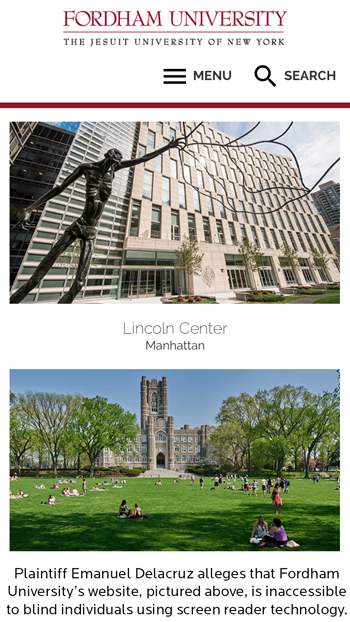Update September 29, 2017: We have discovered that this same week, in addition to suing Fordham University, the College of Westchester, Iona College and the College of New Rochelle have also been named in class action lawsuits alleging that inaccessible websites violate the Americans with Disabilities Act and other laws.
 September 26, 2017
September 26, 2017
Emanuel Delacruz, a blind individual, filed a class action lawsuit in Federal District Court in New York, alleging that Fordham University discriminates against disabled persons due to an "inaccessible" website, at www.fordham.edu Delacruz v. Fordham University, Sept 23, 2017, NY U.S. Dist. Ct., South, 1:17-CV-07253.
Highlights of the Complaint
- "[B]lind and visually impaired people have the ability to access websites using keyboards in conjunction with screen access software that vocalizes the information found on a computer screen or displays the content on a refreshable Braille display... Unless websites are designed to be read by screen-reading software, blind and visually-impaired persons are unable to fully access websites..."
- "Due to the inaccessibility of Defendant’s Website, blind and visually-impaired customers such as Plaintiff, who need screen-readers, cannot fully and equally use or enjoy the facilities and services Defendant offers to the public on its Website."
ADA and Rehabilitation Act Claims
Delacruz claims that various failures by Fordham involving its website constitute a violation of Title III of the Americans with Disabilities Act (ADA), Section 504 of the Rehabilitation Act, as well as New York State civil rights laws.
Remedies
For remedies, Delacruz seeks an injunction requiring Fordham to take all steps necessary to make its website "readily accessible to and usable by blind individuals," as well as compensatory damages along with attorney fees.
Additional Information
Class action lawsuits regarding allegedly non-accessible websites have exploded in the past 24 months. For more information on these legal claims as well as potential risk-reduction actions, visit Fredrikson & Byron’s Website Accessibility page.
Risk Reduction Measures
Based upon past litigation and our experience with dozens of other clients, the following steps can substantially reduce a website operator’s risk of being sued:
- Engage an experienced website accessibility consultant and begin testing and improving your website for accessibility. Please engage a consultant that uses live user/human testing, as the U.S. government and others report that automated tools catch 25 percent or less of accessibility errors. “No automated evaluation tool can tell you if your site is accessible, or even compliant. Manual testing is always necessary,” according to U.S. government website Section508.gov.
- Post an appropriate Website Accessibility Statement.
- Make accessibility part of your standard website and app development and roll-out process. For all web and technology vendors to your company, include a contract requirement that work product is accessible and meets or exceeds the WCAG2.0AA standards.
- Provide training to employees so that they are aware of this issue.
- Appoint an Accessibility Coordinator to stay on top of the issue and ensure follow-up. In the past, I have seen accessible websites become non-accessible in a matter of months due to replacement of content without regard to accessibility.
- Provide a telephone and email method to provide support and receive complaints and feedback from users regarding accessibility issues.
